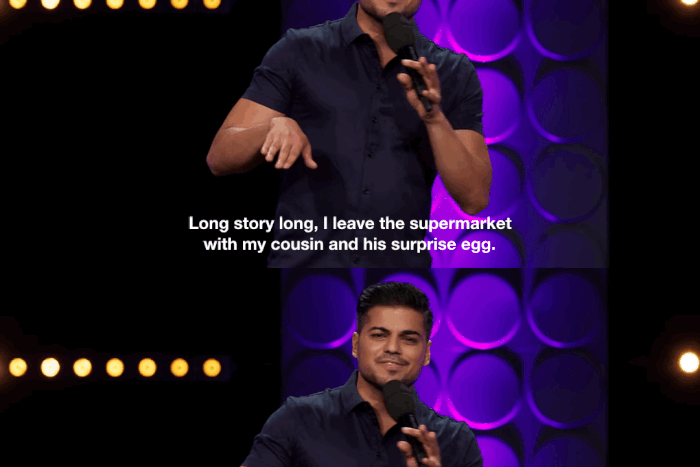
In a 2020 Comedy Central set, comedian Matthew Broussard tells a joke about the peculiar intersection of traits possessed by people who live in Austin, Texas. “Was that guy wearing a Trump yarmulke?” he asks, gesturing at a hypothetical city resident. “A ‘ya-MAGA?’” He lets the punch line hang for a beat before continuing, “Good luck to the subtitle guy with that one, huh?”
Broussard’s concern is not misplaced. The task of converting a comedian’s wordplay, nonverbal cues, and esoteric references into short bursts of text that audiences can process in real time is an unenviable challenge, one that’s become increasingly routine as people across the globe consume more comedy specials than ever before. Today, Netflix’s specials are available to stream in over 190 countries, and Comedy Dynamics — a comedy production company that specializes in distributing specials for comics like Ali Wong, Bill Burr, and Maria Bamford — has had to import specials aggressively to keep up with growing worldwide demand. “Five years ago, we had fewer than 20 specials that were not American or Canadian,” says Brian Volk-Weiss, Comedy Dynamics’s founder and CEO. “Now our library has hundreds of international specials from places like England, France, Spain, Singapore, China, South Africa.”
All that distribution means that fans are watching foreign-language specials subtitled into their local languages — ideally in a manner that captures the nuances of the comedian’s humor and elicits laughs in spite of language barriers. The companies that produce and distribute those specials all have unique processes in place for generating these subtitles. Since 2016, every special produced by Comedy Dynamics has been translated into somewhere between 5 and 15 languages, with the company employing a mixture of automated technology supervised by a native speaker for specials in English, French, and Spanish and manual translations by specialized partners for all other languages. Netflix, meanwhile, translates its specials into more than 35 different languages using a mix of in-house resources and external consultants.
As one might expect, the quality of those subtitles often fails to match the effort it took to produce them. The Comedy Dynamics team sometimes gets complaints passed on to them from comedians whose multilingual viewers notify them of errors. According to Volk-Weiss, a common complaint is some form of: “I speak English and Korean. I know what you said is not what the subtitles say because I was laughing but my friends who only speak Korean weren’t.”
To get a comedian’s perspective on the relationship between their work and the subtitles attached to it, we asked Dutch bilingual comedians Rayen Panday and Martijn Koning to rewatch their 2019 Comedians of the World Netflix specials with English subtitles to evaluate them for accuracy.
“The translation was close,” Panday says. “But it’s hard. A lot of comedy is melodious, and it has to do with rhythm and timing. A lot of subtleties go away with subtitles. There are small words or sentences in Dutch where you can’t really translate every word literally.” Consider the confusing moment in Panday’s special where the subtitles refer to a Kinder Surprise — a chocolate candy egg containing a toy — as a “surprise egg.” “Maybe they didn’t want to use the name because it’s a brand,” he speculates.
In terms of specific translations they felt were clumsy or lacking, Koning and Panday zeroed in on the following moments that tackled Dutch idioms, references, and wordplay where there simply isn’t a direct one-to-one English equivalent:
Panday’s Joke in Dutch: “Ze onderdrukken de hele dag, elke dag … En één dag, tbs.”
The Joke, Subtitled in English: “They just keep suppressing those emotions, until they end up in detention.”
Context of the Joke: Panday is performing a chunk about how social-media managers — although they’re referred to in the English subtitles as “web care operators” — are expected to calmly tolerate abuse from annoying customers. He doesn’t understand how they’re able to suppress the rage this must inspire.
Panday’s Explanation: “In Holland, we have two types of detention. One is like prison. But the other is if you do something that’s really fucked up and they decide you’re mental, you go to prison but for mental patients. It’s a combination of a mental institution and a prison for mentally ill people who commit the most horrific crimes.”
Why It Didn’t Translate: This joke is about a social-media manager tolerating so much customer abuse that they snap, have a mental breakdown, and commit a heinous crime that gets them locked up in a Dutch penal institution. The subtitled joke likely lands differently for audiences in other countries, especially the United States, where detention is primarily associated with something else.
Koning’s Joke in Dutch: “En toen zag ik rechts een bordje en daar stond op ‘Buckelpiste.’ En ik kan geen Duits, maar ik dacht buckle is babypiste. Zo’n heel lieve roze piste met pony’s en clowns en allemaal leuke dingen.”
The Joke, Subtitled in English: “I saw a sign that said ‘Buckelpiste.’ I don’t know German, so I thought it was a slope with buckles, for babies. A buckle-down slope with ponies and clowns and fun stuff like that.”
Context of the Joke: Koning is telling a story about being a novice skier. He’s on the top of a very high hill and is afraid to go down. He sees a slope off to the right labeled “Buckelpiste,” which is a German word he doesn’t understand. He makes an assumption that this means the hill will be easy to ski on when this is actually a German word used to mark complex mogul courses.
Koning’s Explanation: “It’s like saying baby-piste instead of buckelpiste. Because I thought the German word for buckle — well, it’s like Austrian, but it’s German — I thought buckle means baby in Austria.”
Why It Didn’t Translate: Presumably the subtitler knew the pun wouldn’t translate to English, so they constructed an alternate pun between “Buckelpiste” and the English word buckle instead, which doesn’t make sense.
Koning’s Joke in Dutch: “En dit is het moment in de film dat iemand lets heel cools zegt. Weet je wel van: Let’s go or Let’s do it. Iets met Let’s in ieder geval. Maar hij zei helemaal niks met Let’s. Ja, letselschade. Dat had hij mogen zeggen inderdaad.”
The Joke, Subtitled in English: “In the movies, they’ll say something cool. Something like ‘Let’s go’ or ‘Let’s do it.’ Always something starting with ‘Let’s.’ But he didn’t say anything like that. ‘Lesions’ would have been a more appropriate word.”
Context of the Joke: Koning’s brother keeps pressuring him to ski down challenging hills that he doesn’t have the experience to handle. He’s about to ski down a particularly steep hill, slam into a cabin, and lose consciousness.
Koning’s Explanation: “It’s a pun. It sounds like ‘Let’s go’ or ‘Let’s do it.’ But it’s letselschade. That’s what you call a personal injury lawyer. When you hit my car, I go to a personal injury lawyer that handles the pain I have all of a sudden.”
Why It Didn’t Translate: Presumably the subtitler knew a pun using the word letselschade wouldn’t translate to English, so they constructed an alternate pun using the word “lesions” instead, referencing the injuries Koning sustained when he hit the cabin. It’s a clever workaround to make the pun workable in both languages that impressed Koning with its ingenuity: “I must say they’ve done a really good job.”
As an art form where granular details like individual word choices can make the difference between a joke drawing big laughs or falling flat, it’s not enough for subtitles to merely capture the spirit of what a comedian is saying. Professional subtitlers must translate jokes word for word, interpret and transcreate meaning, and understand when it’s most appropriate to utilize these differing approaches. Panday says Netflix gave him the chance to review the English-language subtitles on his special before they released it, and even he initially missed the Kinder Surprise blunder above.
Not every comedian possesses the requisite fluency in multiple languages to police this, but among those who do, there are moments when they feel subtitles do a fair job bottling their essences and moments they feel like subtitles unfavorably distort their material. Koning recognizes, despite identifying some noticeable flaws, that the process is an uphill battle.
“I thought the translations were pretty accurate,” he says. “It’s very difficult for my style because I’m a bit fast. I go from this to that in a couple of seconds.” His bigger concern is that subtitles often give away punch lines before they’re delivered, undercutting the element that makes them effective: “A good punch line has to be a surprise.”
Koning’s point is a reminder of the myriad factors, beyond accuracy, that can prevent a subtitled joke from having its desired effect. While examining the subtitles in his special, he’s quick to couch any criticism he levies, noting he’s ultimately just nitpicking. “You know what we call nitpicking in Dutch?” he asks as an aside. “Mierenneuken.” Had it been included in his special, this expression might have given the subtitlers some trouble. Translated literally, he notes, it means “ant fucking.”


